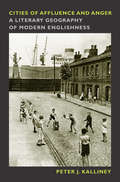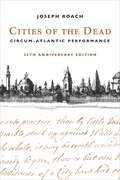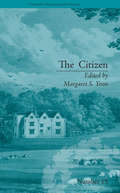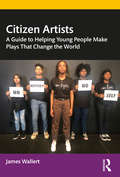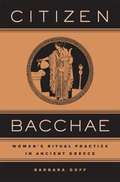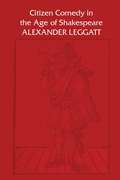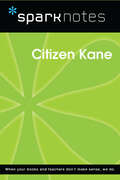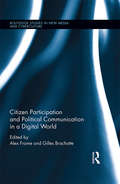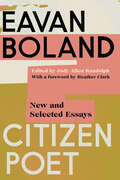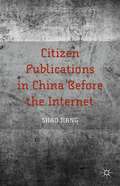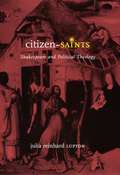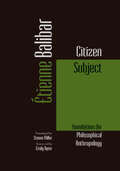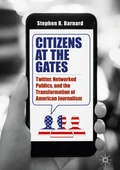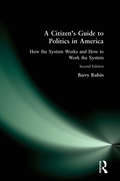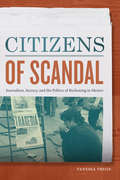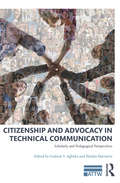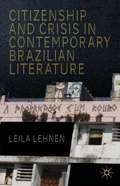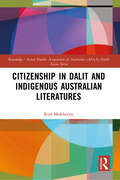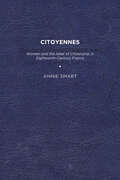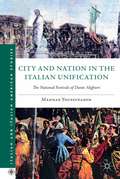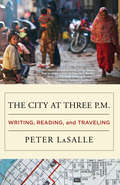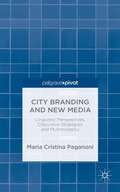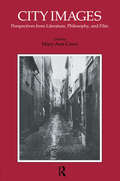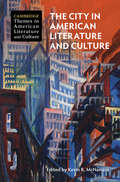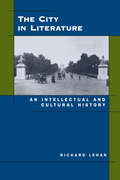- Table View
- List View
Cities of Affluence and Anger: A Literary Geography of Modern Englishness
by Peter J. KallineyProviding a compact literary history of the twentieth century in England, Cities of Affluence and Anger studies the problematic terms of national identity during England's transition from an imperial power to its integration in the global cultural marketplace. While the countryside had been the dominant symbol of Englishness throughout the previous century, modern literature began to turn more and more to the city to redraw the boundaries of a contemporary cultural polity. The urban class system, paradoxically, still functioned as a marker of wealth, status, and hierarchy throughout this long period of self-examination, but it also became a way to project a common culture and mitigate other forms of difference. Local class politics were transformed in such a way that enabled the English to reframe a highly provisional national unity in the context of imperial disintegration, postcolonial immigration, and, later, globalization.Kalliney plots the decline of the country-house novel through an analysis of Forster's Howards End and Waugh's Brideshead Revisited, each ruthless in its sabotage of the trope of bucolic harmony. The traditionally pastoral focus of English fiction gives way to a high-modernist urban narrative, exemplified by Woolf's Mrs. Dalloway, and, later, to realists such as Osborne and Sillitoe, through whose work Kalliney explores postwar urban expansion and the cultural politics of the welfare state. Offering fresh new readings of Lessing's The Golden Notebook and Rushdie's The Satanic Verses, the author considers the postwar appropriation of domesticity, the emergence of postcolonial literature, and the renovation of travel narratives in the context of globalization. Kalliney suggests that it is largely one city--London--through which national identity has been reframed. How and why this transition came about is a process that Cities of Affluence and Anger depicts with exceptional insight and originality.
Cities of the Dead: Circum-Atlantic Performance (The\social Foundations Of Aesthetic Forms Ser.)
by Joseph RoachIn the early eighteenth century, a delegation of Iroquois visited Britain, exciting the imagination of the London crowds with images of the “feathered people” and warlike “Mohocks.” Today, performing in a popular Afrodiasporic tradition, “Mardi Gras Indians” or “Black Masking Indians” take to the streets of New Orleans at carnival time and for weeks thereafter, parading in handmade “suits” resplendent with beadwork and feathers. What do these seemingly disparate strands of culture share over three centuries and several thousand miles of ocean?Interweaving theatrical, musical, and ritual performance along the Atlantic rim from the eighteenth century to the present, Cities of the Dead explores a rich continuum of cultural exchange that imaginatively reinvents, recreates, and restores history. Joseph Roach reveals how performance can revise the unwritten past, comparing patterns of remembrance and forgetting in how communities forge their identities and imagine their futures. He examines the syncretic performance traditions of Europe, Africa, and the Americas in the urban sites of London and New Orleans, through social events ranging from burials to sacrifices, auctions to parades, encompassing traditions as diverse as Haitian Voudon and British funerals. Considering processes of substitution, or surrogation, as enacted in performance, Roach demonstrates the ways in which people and cultures fill the voids left by death and departure.The twenty-fifth anniversary edition of this classic work features a new preface reflecting on the relevance of its arguments to the politics of performance and performance in contemporary politics.
The Citizen: by Ann Gomersall (Chawton House Library: Women's Novels #15)
by Margaret S YoonAnn Gomersall’s The Citizen (1790) is an epistolary novel, written over two volumes. Gomersall came out of the merchant class in Leeds and little else is known about her, but she began writing to raise funds for her merchant husband to re-enter business after he lost his money. This is the first modern critical edition of Gomersall’s work.
Citizen Artists: A Guide to Helping Young People Make Plays That Change the World
by James WallertCitizen Artists takes the reader on a journey through the process of producing, funding, researching, creating, rehearsing, directing, performing, and touring student-driven plays about social justice. The process at the heart of this book was developed from 2015–2021 at New York City’s award-winning Epic Theatre Ensemble with and for their youth ensemble: Epic NEXT. Author and Epic Co-Founder James Wallert shares his company’s unique, internationally recognized methodology for training young arts leaders in playwriting, inquiry-based research, verbatim theatre, devising, applied theatre, and performance. Readers will find four original plays, seven complete timed-to-the-minute lesson plans, 36 theatre arts exercises, and pages of practical advice from more than two dozen professional teaching artists to use for their own theatre making, arts instruction, or youth organizing. Citizen Artists is a one-of-a-kind resource for students interested in learning about theatre and social justice; educators interested in fostering learning environments that are more rigorous, democratic, and culturally-responsive; and artists interested in creating work for new audiences that is more inclusive, courageous, and anti-racist.
Citizen Bacchae: Women's Ritual Practice in Ancient Greece
by Barbara GoffThis book offers answers what activities did the women of ancient Greece perform in the sphere of ritual, and the meanings of such activities for them and their culture. It aims to recover and reconstruct an important dimension of the lived experience of ancient Greek women. It draws on a wide range of evidence from across the Greek world, including literary and historical texts, inscriptions, and vase-paintings, to assemble a portrait of women as religious and cultural agents.
Citizen Comedy in the Age of Shakespeare (The Royal Society of Canada Special Publications)
by Alexander LeggattThis is the first book to survey comprehensively the field of Elizabethan and Jacobean citizen comedy. Most studies of the period focus on major authors; this one follows recurring themes and motifs, through a variety of plays by many authors from the moralizing comedies of the boys' companies. Professor Leggatt provides not only a fresh perspective on familiar plays by such figures as Jonson, Middleton, and Dekker, but also a new look at a number of neglected comedies, some by unfamiliar authors, some by major authors working together. Standard figures – the usurer, the prodigal, and the prostitute – and standard plots – notably intrigues based on money or sex (or both) – are traced to show the changes that occur in apparently stereotyped material at the hands of individual authors. The result is to display the range and internal variety of a genre that too often is seen as all of a piece, and to show the different ways in which social thinking can interact with the demands and comic form.This book will interest students of Renaissance English drama, both for its treatment of a neglected type of play and for its comments on individual citizen comedies. Those who are concerned with drama as a vehicle for social commentary will find many points for discussion.
Citizen Kane (SparkNotes Film Guide)
by SparkNotesCitizen Kane (SparkNotes Film Guide) Making the reading experience fun! SparkNotes Film Guides are one-stop guides to great works of film–masterpieces that are the foundations of filmmaking and film studies. Inside each guide you&’ll find thorough, insightful overviews of films from a variety of genres, styles, and time periods. Each film guide contains:Information about the director and the context in which the film was made Thoughtful analysis of major characters Details about themes, motifs, and symbols Explanations of the most important lines of dialogue In-depth discussions about what makes a film so remarkable SparkNotes Film Guides are an invaluable resource for students or anyone who wants to gain a deeper understanding of the great films they know and love.
Citizen Participation and Political Communication in a Digital World (Routledge Studies in New Media and Cyberculture #32)
by Alex Frame Gilles BrachotteThe arrival of the participatory web 2.0 has been hailed by many as a media revolution, bringing with it new tools and possibilities for direct political action. Through specialised online platforms, mainstream social media or blogs, citizens in many countries are increasingly seeking to have their voices heard online, whether it is to lobby, to support or to complain about their elected representatives. Politicians, too, are adopting "new media" in specific ways, though they are often criticised for failing to seize the full potential of online tools to enter into dialogue with their electorates. Bringing together perspectives from around the world, this volume examines emerging forms of citizen participation in the face of the evolving logics of political communication, and provides a unique and original focus on the gap which exists between political uses of digital media by the politicians and by the people they represent.
Citizen Poet: New and Selected Essays
by Eavan BolandA landmark volume of essays from “Ireland’s leading feminist poet” (New York Times Book Review) that celebrates a transformative vision of womanhood, nation, and poetry. Eavan Boland was a trailblazing poet, critic, teacher, and essayist. Carving a path for the next generation, she broke open the male-dominated canon of Irish literature and mapped her poetic journey through the contours of life as a mother, daughter, and citizen. This generous and wise volume contains essays selected from Object Lessons (1995) and A Journey with Two Maps (2011); later writings addressing the changing nature of poetry; and a draft of a reflective memoir called “Daughter,” on which Boland was working at the time of her death. A compelling blend of memoir, analysis, and argument, Citizen Poet traces the arc of Boland’s pioneering view of nationhood through the lens of womanhood.
Citizen Publications in China Before the Internet
by Shao JiangThis book presents the first panoramic study of minkan (citizen publications) in China before the Internet, from the 1950s to the 1980s. Drawing on theories of civil society and the public sphere, this study explores the creative practice of minkan as a revival of the concept of 'moveable words' in the Chinese print tradition. When examined against the backdrop of a much older history of Chinese print culture and its renaissance, this recent history of citizen publications also contributesto the reclamation of a lost past of resistance. It is an exercise in remembering a past that has been marginalized and excluded by official history and recovering thoughts and practices obliterated by state power. This book attempts to reconstruct the narrative of modern Chinese history by analyzing the development of a civil society that is independent of both the state elite and the new apolitical bourgeoisie in mainland China.
Citizen-Saints: Shakespeare and Political Theology
by Julia Reinhard LuptonTurning to the potent idea of political theology to recover the strange mix of political and religious thinking during the Renaissance, this bracing study reveals in the works of Shakespeare and his sources the figure of the citizen-saint, who represents at once divine messenger and civil servant, both norm and exception. Embodied by such diverse personages as Antigone, Paul, Barabbas, Shylock, Othello, Caliban, Isabella, and Samson, the citizen-saint is a sacrificial figure: a model of moral and aesthetic extremity who inspires new regimes of citizenship with his or her death and martyrdom. Among the many questions Julia Reinhard Lupton attempts to answer under the rubric of the citizen-saint are: how did states of emergency, acts of sovereign exception, and Messianic anticipations lead to new forms of religious and political law? What styles of universality were implied by the abject state of the pure creature, at sea in a creation abandoned by its creator? And how did circumcision operate as both a marker of ethnicity and a means of conversion and civic naturalization? Written with clarity and grace, Citizen-Saints will be of enormous interest to students of English literature, religion, and early modern culture.
Citizen Subject: Foundations for Philosophical Anthropology (Commonalities)
by Étienne BalibarWhat can the universals of political philosophy offer to those who experience "the living paradox of an inegalitarian construction of egalitarian citizenship"? Citizen Subject is the summation of Étienne Balibar’s career-long project to think the necessary and necessarily antagonistic relation between the categories of citizen and subject. In this magnum opus, the question of modernity is framed anew with special attention to the self-enunciation of the subject (in Descartes, Locke, Rousseau, and Derrida), the constitution of the community as “we” (in Hegel, Marx, and Tolstoy), and the aporia of the judgment of self and others (in Foucualt, Freud, Kelsen, and Blanchot).After the “humanist controversy” that preoccupied twentieth-century philosophy, Citizen Subject proposes foundations for philosophical anthropology today, in terms of two contrary movements: the becoming-citizen of the subject and the becoming-subject of the citizen. The citizen-subject who is constituted in the claim to a “right to have rights” (Arendt) cannot exist without an underside that contests and defies it. He—or she, because Balibar is concerned throughout this volume with questions of sexual difference—figures not only the social relation but also the discontent or the uneasiness at the heart of this relation. The human can be instituted only if it betrays itself by upholding “anthropological differences” that impose normality and identity as conditions of belonging to the community.The violence of “civil” bourgeois universality, Balibar argues, is greater (and less legitimate, therefore less stable) than that of theological or cosmological universality. Right is thus founded on insubordination, and emancipation derives its force from otherness.Ultimately, Citizen Subject offers a revolutionary rewriting of the dialectic of universality and differences in the bourgeois epoch, revealing in the relationship between the common and the universal a political gap at the heart of the universal itself.
Citizens at the Gates: Twitter, Networked Publics, and the Transformation of American Journalism
by Stephen R. BarnardDrawing insights from nearly a decade of mixed-method research, Stephen R. Barnard analyzes Twitter’s role in the transformation of American journalism. As the work of media professionals grows increasingly hybrid, Twitter has become an essential space where information is shared, reporting methods tested, and power contested. In addition to spelling opportunity for citizen media activism, the normalization of digital communication adds new channels of influence for traditional thought leaders, posing notable challenges for the future of journalism and democracy. In his analyses of Twitter practices around newsworthy events—including the Boston Marathon bombing, protests in Ferguson, Missouri, and the election of Donald Trump—Barnard brings together conceptual and theoretical lenses from multiple academic disciplines, bridging sociology, journalism, communication, media studies, science and technology studies, and political science.
A Citizen's Guide to Politics in America: How the System Works and How to Work the System
by Barry RubinThis book is an antidote for civic apathy and disillusionment. It takes the reader step-by-step through the process of successful action for change -- from the germ of an idea to finding allies, getting the word out, and building the critical mass of people, energy, and support to accomplish the desired result.Filled with abundant practical examples and guidelines for success, the book covers all the bases: how to recognize that it's time for action; how to lobby decision makers; how to go to court; how to use information; how to use the internet effectively; how to get media attention; how to influence public opinion; how to mobilize grassroots support; how to form coalitions; how to organize an initiative or referendum; and more.
Citizens of Scandal: Journalism, Secrecy, and the Politics of Reckoning in Mexico
by Vanessa FreijeIn Citizens of Scandal, Vanessa Freije explores the causes and consequences of political scandals in Mexico from the 1960s through the 1980s. Tracing the process by which Mexico City reporters denounced official wrongdoing, she shows that by the 1980s political scandals were a common feature of the national media diet. News stories of state embezzlement, torture, police violence, and electoral fraud provided collective opportunities to voice dissent and offered an important, though unpredictable and inequitable, mechanism for political representation. The publicity of wrongdoing also disrupted top-down attempts by the ruling Partido Revolucionario Institucional to manage public discourse, exposing divisions within the party and forcing government officials to grapple with popular discontent. While critical reporters denounced corruption, they also withheld many secrets from public discussion, sometimes out of concern for their safety. Freije highlights the tensions—between free speech and censorship, representation and exclusion, and transparency and secrecy—that defined the Mexican public sphere in the late twentieth century.
Citizenship and Advocacy in Technical Communication: Scholarly and Pedagogical Perspectives (ATTW Series in Technical and Professional Communication)
by Godwin Y. Agboka Natalia MatveevaIn Citizenship and Advocacy in Technical Communication, teachers, researchers, and practitioners will find a variety of theoretical frameworks, empirical studies, and teaching approaches to advocacy and citizenship. Specifically, the collection is organized around three main themes or sections: considerations for understanding and defining advocacy and citizenship locally and globally, engaging with the local and global community, and introducing advocacy in a classroom. The collection covers an expansive breadth of issues and topics that speak to the complexities of undertaking advocacy work in TPC, including local grant writing activities, cosmopolitanism and global transnational rhetoric, digital citizenship and social media use, strategic and tactical communication, and diversity and social justice. The contributors themselves, representing fifteen academic institutions and occupying various academic ranks, offer nuanced definitions, frameworks, examples, and strategies for students, scholars, practitioners, and educators who want to or are already engaged in a variegated range of advocacy work. More so, they reinforce the inherent humanistic values of our field and discuss effective rhetorical and current technological tools at our disposal. Finally, they show us how, through pedagogical approaches and everyday mundane activities and practices, we (can) advocate either actively or passively.
Citizenship and Crisis in Contemporary Brazilian Literature
by Leila LehnenConsidering how literary texts address the transformations that Brazil has undergone since its 1985 transition to democracy, this study proposes that Brazilian contemporary literature is informed by the struggle for social, civil, and cultural rights and that literary production has created spaces for historically disenfranchised communities.
Citizenship in Dalit and Indigenous Australian Literatures (Routledge / Asian Studies Association of Australia (ASAA) South Asian Series)
by Riya MukherjeeCitizenship in Dalit and Indigenous Australian Literatures examines the difference in citizenship as experienced by the communities of Dalits in India and Aboriginals in Australia through an analysis of select literature by authors of these marginalised groups. Aligning the voices of two disparate communities, the author creates a transnational dialogue between the subaltern communities of the two countries, India and Australia, through the literature produced by the two communities. The Covid-19 pandemic has made the divide that exists between the performative citizenship rights enjoyed by the Dalits and the aboriginals and the respective dominant communities of their countries more apparent. The author addresses the issue of this disparity between discursive and performative citizenship through a detailed analysis of select Dalit and Australian aboriginal autobiographies, in particular the works by Dalit autobiographers, Baby Kamble and Aravind Malagatti and aboriginal autobiographers Alice Nannup and Gordon Briscoe. The book uses the dominant tropes of the individual autobiographies as a background to unfurl the denial of citizenship, both in the discursive and the performative form, using the parameters of equal citizenship. In doing so, the author also raises important, groundbreaking questions: How is the performativity of citizenship foregrounded by the Dalits and aboriginals in the literary counter-public? How does this foregrounding evoke violent retribution from the dominant sections? And does the continued violation of performative citizenship point to the dysfunctionality of the performative citizenship status accorded to the Dalits and the aboriginals? Questioning the liberal legacy of political, civil and social citizenship, this book will be of interest to researchers studying Dalit and Aboriginal Literature, Interdisciplinary Literary Studies and World Literature, South Asian Studies and researchers dealing with the question of citizenship.
Citoyennes: Women and the Ideal of Citizenship in Eighteenth-Century France
by Annie K. SmartDid women have a civic identity in eighteenth-century France? In Citoyennes: Women and the Ideal of Citizenship in Eighteenth-Century France, Annie Smart contends that they did. While previous scholarship has emphasized the ideal of domestic motherhood or the image of the republican mother, Smart argues persuasively that many pre-revolutionary and revolutionary texts created another ideal for women–the ideal of civic motherhood. Smart asserts that women were portrayed as possessing civic virtue, and as promoting the values and ideals of the public sphere. Contemporary critics have theorized that the eighteenth-century ideal of the Republic intentionally excluded women from the public sphere. According to this perspective, a discourse of “Rousseauean” domestic motherhood stripped women of an active civic identity, and limited their role to breastfeeding and childcare. Eighteenth-century France marked thus the division between a male public sphere of political action and a female private sphere of the home. Citoyennes challenges this position and offers an alternative model of female identity. This interdisciplinary study brings together a variety of genres to demonstrate convincingly that women were portrayed as civic individuals. Using foundational texts such as Jean-Jacques Rousseau’s Emile, or on Education (1762), revolutionary gouaches of Lesueur, and vaudeville plays of Year II of the Republic (1793/1794), this study brilliantly shows that in text and image, women were represented as devoted to both the public good and their families. In addition, Citoyennes offers an innovative interpretation of the home. Through re-examining sphere theory, this study challenges the tendency to equate the home with private concerns, and shows that the home can function as a site for both private life and civic identity. Citoyennes breaks new ground, for it both rectifies the ideal of domestic Rousseauean motherhood, and brings a fuller understanding to how female civic identity operated in important French texts and images. Published by University of Delaware Press. Distributed worldwide by Rutgers University Press.
City and Nation in the Italian Unification: The National Festivals of Dante Alighieri (Italian and Italian American Studies)
by Mahnaz YousefzadehThis study of the first national festival of modern Italy historically reconstructs the event, using a mass of un-catalogued and unpublished documents left by the organizers, which positions the Centenary as a platform upon which an alternative definition of Italian national identity emerged.
The City at Three PM
by Peter LasalleIn "The City at Three PM," award-winning fiction writer Peter LaSalle offers 11 startlingly original personal essays dealing with his longtime quest for world travel. These literary errands range from driving recklessly across the county to seek out Saul Bellow in Chicago to settling in for long evenings at a pub in Dublin with Christy Brown, the celebrated Irish author afflicted with cerebral palsy who typed with his toes. In Buenos Aires LaSalle senses metaphysical transport while investigating Borges' work; in Cameroon he attends the wonderful opening of a small bookstore; in Hollywood he finds himself caught in a crazy mob scene while researching the work of 1930s master American novelist and screenwriter Nathanael West; in Tunisia he follows in the footsteps of Flaubert at the ruins of ancient Carthage. And those are just some of the adventures. Having first appeared in distinguished publications here and abroad, including "The Best American Travel Writing," these are beautifully crafted pieces, heartfelt, honest, observant, and often moving toward genuine transcendence. Overall they conjure up those fine moments when travel intersects with the important role of literature in our lives, in this case yielding writing entirely unique and satisfying.
City Branding and New Media: Linguistic Perspectives, Discursive Strategies and Multimodality
by Maria Cristina PaganoniThis book explores city branding in the public sector as an aspect of e-governance from a privileged linguistic, discursive and semiotic perspective. It analyses how local administrations and public bodies engage their stakeholders by addressing key issues such as active citizenship, social inclusion and promotion of cultural heritage and events.
City Images: Perspectives from Literature, Philosophy and Film
by CawsFirst Published in 1991. Routledge is an imprint of Taylor & Francis, an informa company.
The City in American Literature and Culture (Cambridge Themes in American Literature and Culture)
by Kevin R. McNamaraThe city's 'Americanness' has been disputed throughout US history. Pronounced dead in the late twentieth century, cities have enjoyed a renaissance in the twenty-first. Engaging the history of urban promise and struggle as represented in literature, film, and visual arts, and drawing on work in the social sciences, The City in American Literature and Culture examines the large and local forces that shape urban space and city life and the street-level activity that remakes culture and identities as it contests injustice and separation. The first two sections examine a range of city spaces and lives; the final section brings the city into conversation with Marxist geography, critical race studies, trauma theory, slow/systemic violence, security theory, posthumanism, and critical regionalism, with a coda on city literature and democracy.
The City in Literature: An Intellectual and Cultural History
by Richard LehanThis sweeping literary encounter with the Western idea of the city moves from the early novel in England to the apocalyptic cityscapes of Thomas Pynchon. Along the way, Richard Lehan gathers a rich entourage that includes Daniel Defoe, Charles Dickens, Emile Zola, Bram Stoker, Rider Haggard, Joseph Conrad, James Joyce, Theodore Dreiser, F. Scott Fitzgerald, and Raymond Chandler. The European city is read against the decline of feudalism and the rise of empire and totalitarianism; the American city against the phenomenon of the wilderness, the frontier, and the rise of the megalopolis and the decentered, discontinuous city that followed. Throughout this book, Lehan pursues a dialectic of order and disorder, of cities seeking to impose their presence on the surrounding chaos. Rooted in Enlightenment yearnings for reason, his journey goes from east to west, from Europe to America. In the United States, the movement is also westward and terminates in Los Angeles, a kind of land's end of the imagination, in Lehan's words. He charts a narrative continuum full of constructs that "represent" a cycle of hope and despair, of historical optimism and pessimism.Lehan presents sharply etched portrayals of the correlation between rationalism and capitalism; of the rise of the city, the decline of the landed estate, and the formation of the gothic; and of the emergence of the city and the appearance of other genres such as detective narrative and fantasy literature. He also mines disciplines such as urban studies, architecture, economics, and philosophy, uncovering material that makes his study a lively read not only for those interested in literature, but for anyone intrigued by the meanings and mysteries of urban life.
